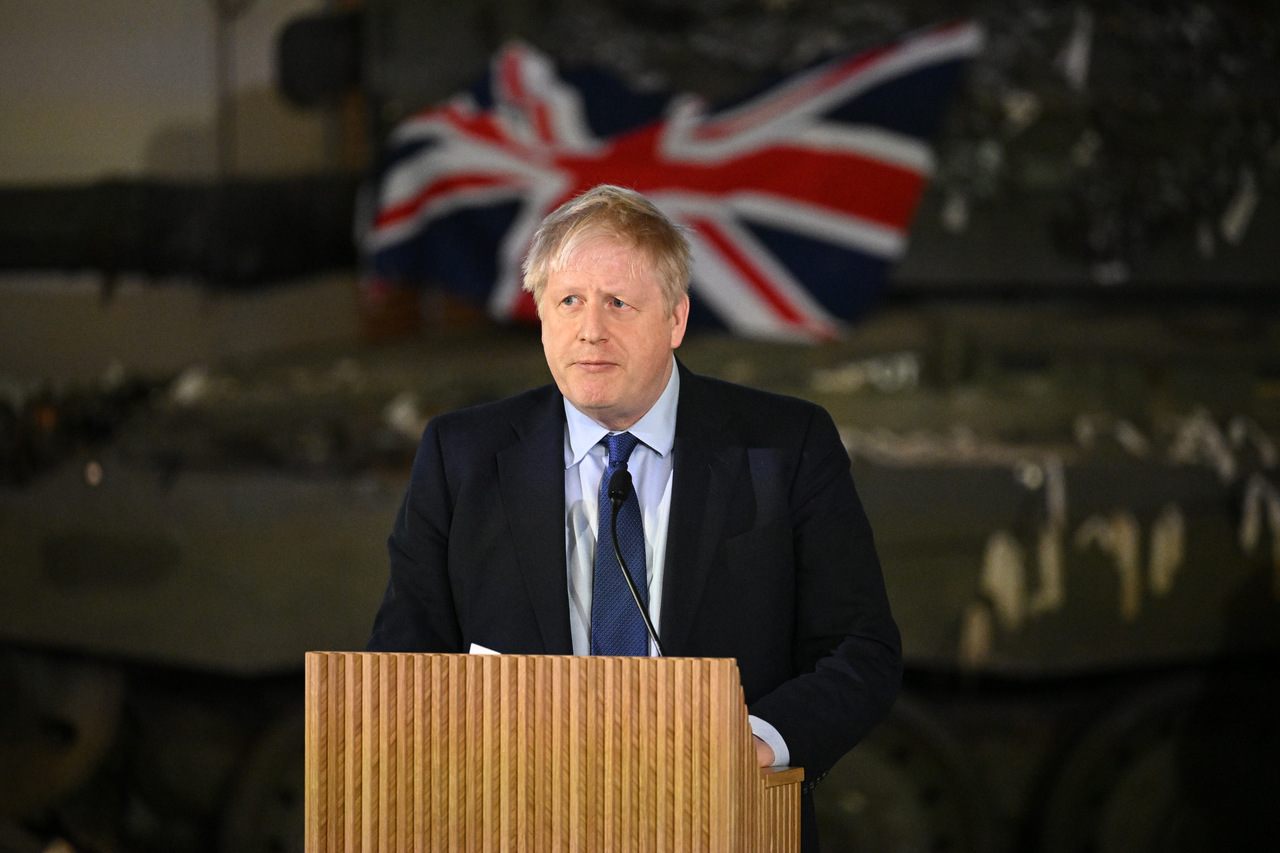The UK's Response to the Russian Invasion of Ukraine
On 1 March, Prime Ministers Mateusz Morawiecki and Boris Johnson met in Warsaw. The leaders reaffirmed their support for Ukraine in the face of the Russian invasion and announced the continuation of aid efforts. So far, the United Kingdom has introduced extensive sanctions and strengthened its military presence on NATO’s Eastern Flank. Nonetheless, the effectiveness of its actions will depend on further coordination of efforts with Poland and other allies.
 Fot. Leon Neal/PA Images/Forum
Fot. Leon Neal/PA Images/Forum
What is the British stance on the Russian invasion of Ukraine?
The UK unequivocally condemned Russia’s attack on a sovereign and democratic Ukraine as a flagrant violation of international law and the Charter of the United Nations. Already on the first day of the invasion of Ukraine, Prime Minister Johnson announced the imposition of extensive sanctions against Russia and Belarus and called on allies to take coordinated action. He also pointed to the need to cut off Russia from the SWIFT system and to limit European dependence on oil and natural gas imports from Russia. The actions taken are a continuation of British policy towards Russia whereby that country is perceived as a significant threat to the West.
What was the role played by the British prior to Russia’s invasion of Ukraine?
The UK had been actively strengthening Ukraine’s defence capabilities since the Russian aggression in 2014. In 2015, the British launched the Orbital training mission, which until the start of the current hostilities had trained more than 22,000 Ukrainian soldiers, including in the use of Western weapon systems. In 2020, Ukraine and the UK concluded agreements on a strategic partnership and on British aid for the reconstruction of the Ukrainian navy. From November 2021, the UK has supplied defensive weapons (including NLAW anti-tank missiles). Diplomatic attempts to avert war included visits to Moscow on 10 and 11 February by Foreign Minister Liz Truss and Defence Minister Ben Wallace, respectively. On 17 February, Truss announced in Kyiv the conclusion of a Trilateral Memorandum of Cooperation with Poland and Ukraine to strengthen their strategic cooperation within the framework of the International Crimea Platform, and on cyber, energy, and information security, among others.
What are the British financial sanctions against Russia?
After Brexit, the UK has been running an independent sanctions policy. However, it has been coordinated diplomatically with the U.S. and the EU. The latest package of British sanctions against Russia, introduced since 24 February, supplements the ones introduced in the aftermath of the Russian aggression in Ukraine in 2014 and the Salisbury toxin attack in 2018. Financial sanctions are a prominent part of the UK’s toolbox because of the leading role played globally by the British stock exchange and its banking and insurance industry. The UK decided to cut off Russian retail banks from the SWIFT international transaction system and from the Visa and Mastercard clearing systems, as well as to freeze within its jurisdiction the reserves of the Central Bank of Russia and the accounts of Russian oligarchs. Britain will also stop Russian authorities and businesses from using its financial market to issue sovereign debt or raise capital.
What is the scope of the British economic and personal sanctions against Russia and Russians?
The economic sanctions restrict high technology exports to Russia, such as semiconductors or drilling and oil refining equipment. The UK was the first in Europe to close its air and maritime space to Russian craft. Personal sanctions include an entry ban and freezes on assets belonging to more than a hundred members of Russia’s business and political elite. In particular, the personal sanctions targeted Vladimir Putin, Sergey Lavrov, and other individuals in high positions in the Russian Federation, effectively putting into question their political legitimacy. A number of British companies, including BP, have announced their intention to withdraw from investments in Russia. The financial sanctions against Russia were extended to Belarus because of its complicity in the invasion and hostilities in Ukraine.
What British material, economic, and humanitarian aid has been made for Ukraine?
In 2021, the UK granted Ukraine loans for military modernisation and supplied weapons worth about £2 billion. Currently, it coordinates the international deliveries of arms and war supplies (including lethal aid). On 1 February, Britain also granted Ukraine a loan of around £2 billion for the implementation of joint projects in the field of infrastructure and energy. After the hostilities started on 24 February, the UK guaranteed additional loans for Ukraine worth around £400 million. British official humanitarian aid of around £140 million includes food, medicine, medical equipment, blankets, clothing supplies, as well as distribution teams in Poland and Ukraine. The British authorities plan to allow visa-free entry to Ukrainian citizens who have family members in the UK and extended by one year the right of stay of Ukrainians already present in the country.
Is there anything hindering EU-UK cooperation?
The post-Brexit Trade and Cooperation Agreement lacks a framework for formal cooperation in foreign and security affairs. The British side decided to omit this policy area, finding the EU proposals in this regard as not reflective of the importance of the UK input into European security. The EU and UK have also been in dispute concerning the implementation of the border on the island of Ireland and EU fishing in British waters (in particular, concerning fishing boats from France, which currently holds the EU presidency). The security crisis in Europe clearly demonstrates the need to reassess the framework of the Union’s defence and military-industrial cooperation with the UK. The importance of British involvement in European security is illustrated, among others, by the deployment on 26 February of additional land, air, and naval assets to NATO’s Eastern Flank. The UK have doubled the British Army contingent in Estonia, where it is the framework nation for allied forces. In addition, the Royal Navy operates in the Eastern Mediterranean while the Royal Air Force patrols over Poland and Romania.
What actions might Britain take next?
Further rapid actions—coordinated with allies—are key to sustaining the Ukrainian resistance to Russia. Quick deliveries from the UK to Ukraine of military equipment, including offensive weapons, are particularly important. Coordination of equipment supplies could take place within a system proposed by the EU that assumes cooperation with NATO. Within this framework, Poland performs the role of a logistical hub. The British involvement so far constitutes one of the pillars of NATO’s Eastern Flank and the credibility of its deterrence against Russia. In addition, it would be worthwhile if the UK extended the list of people and entities subject to sanctions in coordination with the EU, the U.S., and other allies. It will be welcome news if the UK regulator Ofcom decided to withdraw the licenses of the British outlets of RT and Sputnik, both disinformation sources. The British extension to Belarus of the package of financial and economic sanctions against Russia is worth replicating by the EU.



